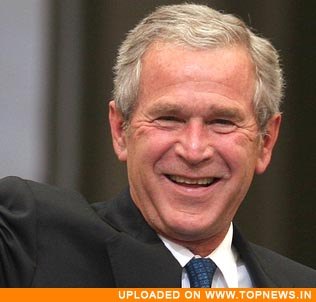Bush departs hoping history will be kinder
 Washington - George W Bush's time in the White House ended on Tuesday, as he departed Washington with a long list of unpopular policies and a low public standing, but ever optimistic that the longer view of history will judge him more kindly.
Washington - George W Bush's time in the White House ended on Tuesday, as he departed Washington with a long list of unpopular policies and a low public standing, but ever optimistic that the longer view of history will judge him more kindly.
Bush looked on as Barack Obama was sworn in Tuesday on the Capitol steps as the 44th president. Moments later the two men shook hands and Bush began the journey back to Texas. He and former first lady Laura Bush boarded a helicopter, no longer known by the presidential name "Marine One," to Andrews Air Force Base for their flight home.
Before boarding the plane, Bush, 62, addressed a gathering of supporters and former White House staff behind closed doors. A White House source had said Bush earlier resisted staff requests to hold a final "goodbye" reception, preferring to quietly leave the nation's capital.
Bush left the event and appeared emotional as he climbed the steps to the plane's cabin.
Bush departs with some of the lowest approval ratings ever. Ensnared by the worst recession in decades and handing over two wars in Afghanistan and Iraq, Bush's average approval rating calculated by realclearpolitics. com was at 29 per cent.
Bush's image contrasts with the new president, who is coming into office with a 73-per-cent favourability rating. It also contrasts with his recent predecessors whom he will now join as he takes up post-presidential life, including plans to promote the world freedom agenda that so dominated his time in the White House.
Ronald Reagan left office with a 68-per-cent approval rating, Bush's father departed with 54 per cent, while Bill Clinton equalled Reagan. Jimmy Carter, the last president to leave with an approval rating below 50 per cent, decades later has transformed himself from an unpopular president into a Nobel Peace Prize winner through his human rights causes around the world.
Bush has said he does not intend to remain on the sidelines as an ordinary citizen after returning to Texas.
"I just can't envision myself, you know, the big straw hat and Hawaiian shirt sitting on some beach," Bush said at his final press conference last week.
In addition to beginning work on a presidential library, Bush plans to launch his Freedom Institute think tank to promote democracy and human rights.
Bush embraced that ideology like no recent president before him, but his aggressive approach - invading Iraq, tightening sanctions, isolating unfriendly governments, and abuses in the war on terror - defined his presidency after the September 11, 2001 attacks.
Out of office, Bush said he will for some time avoid the limelight and allow the new president to move forward, but will at some point begin taking up the causes he hopes will repair his battered reputation in post-presidential life.
Although Bush's legacy is mostly rooted in foreign policy, the final months of his presidency will be remembered for a debilitating financial crisis that laid bare the excesses of US-style capitalism and quickly spread around the world.
The economic downturn was mostly the result of unnecessary risks taken by Wall Street's investors. While little of the financial crisis can be directly blamed on Bush, it forced the free-market oriented Republican to break with his ideology and embark on a series of massive government bail-outs and takeovers of private banks.
"Wall Street got drunk and we got the hangover," Bush said last week. "I readily concede I chunked aside some of my free market principles when I was told ... the situation we were facing could be worse than the Great Depression." (dpa)